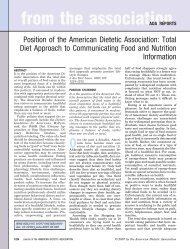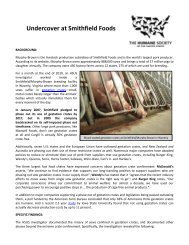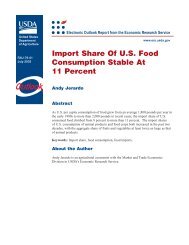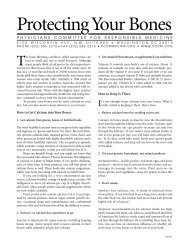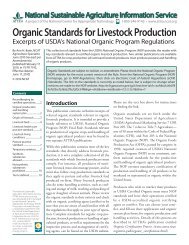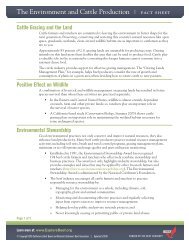THE MYTHS OF VEGETARIANISM Stephen Byrnes, PhD
THE MYTHS OF VEGETARIANISM Stephen Byrnes, PhD
THE MYTHS OF VEGETARIANISM Stephen Byrnes, PhD
You also want an ePaper? Increase the reach of your titles
YUMPU automatically turns print PDFs into web optimized ePapers that Google loves.
MYTH #3: Our needs for vitamin D can be met by sunlight.Though not really a vegetarian myth per se, it is widely believed that one’s vitamin D needs canbe met simply by exposing one’s skin to the sun’s rays for 15-20 minutes a few times a week.Concerns about vitamin D deficiencies in vegetarians and vegans always exist as this nutrient, inits full-complex form, is only found in animal fats (18) which vegans do not consume and moremoderate vegetarians only consume in limited quantities due to their meatless diets.It is true that a limited number of plant foods such as alfalfa, sunflower seeds, and avocado,contain the plant form of vitamin D (ergocalciferol, or vitamin D2). Although D2 can be used toprevent and treat the vitamin D deficiency disease, rickets, in humans, it is questionable, though,whether this form is as effective as animal-derived vitamin D3 (cholecalciferol). Some studieshave shown that D2 is not utilized as well as D3 in animals (19) and clinicians have reporteddisappointing results using vitamin D2 to treat vitamin D-related conditions (20).Although vitamin D can be created by our bodies by the action of sunlight on our skin, it is verydifficult to obtain an optimal amount of vitamin D by a brief foray into the sun. There are threeultraviolet bands of radiation that come from sunlight named A, B, and C. Only the “B” form iscapable of catalyzing the conversion of cholesterol to vitamin D in our bodies (21) and UV-B raysare only present at certain times of day, at certain latitudes, and at certain times of the year (22).Furthermore, depending on one’s skin color, obtaining 200-400 IUs of vitamin D from the sun cantake as long as two full hours of continual sunning (23). A dark-skinned vegan, therefore, willfind it impossible to obtain optimal vitamin D intake by sunning himself for 20 minutes a fewtimes a week, even if sunning occurs during those limited times of the day and year when UV-Brays are available.The current RDA for vitamin D is 400 IUs, but Dr. Weston Price’s seminal research into healthynative adult people’s diets showed that their daily intake of vitamin D (from animal foods) wasabout 10 times that amount, or 4,000 IUs (24). Accordingly, Dr. Price placed a great emphasis onvitamin D in the diet. Without vitamin D, for example, it is impossible to utilize minerals likecalcium, phosphorous, and magnesium. Recent research has confirmed Dr. Price’s higherrecommendations for vitamin D for adults (25).Since rickets and/or low vitamin D levels has been well-documented in many vegetarians andvegans (26), since animal fats are either lacking or deficient in vegetarian diets (as well as thoseof the general Western public who routinely try to cut their animal fat intake), since sunlight isonly a source of vitamin D at certain times and at certain latitudes, and since current dietaryrecommendations for vitamin D are too low, this emphasizes the need to have reliable andabundant sources of this nutrient in our daily diets. Good sources include cod liver oil, lard frompigs that were exposed to sunlight, shrimp, wild salmon, sardines, butter, full-fat dairy products,and eggs from properly fed chickens.MYTH #4: The body's needs for vitamin A can be entirely obtained from plant foods.True vitamin A, or retinol and its associated esters, is only found in animal fats and organs likeliver (27). Plants do contain beta-carotene, a substance that the body can convert into vitamin Aif certain conditions are present (see below). Beta-carotene, however, is not vitamin A. It istypical for vegans and vegetarians (as well as most popular nutrition writers) to say that plantfoods like carrots and spinach contain vitamin A and that beta-carotene is just as good as vitaminA. These things are not true even though beta-carotene is an important nutritional factor forhumans.




